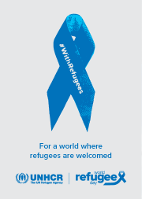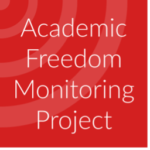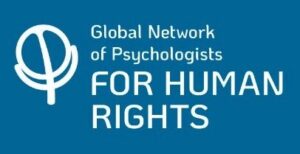Note from the Editors: The website of the Global Network of Psychologists for Human Rights (GNPHR) contains articles, events and news about the domain where psychology and human rights intersect. The information presented in this Bulletin is gathered from many sources and reflects many opinions. The publication of information does not imply that the GNPHR as a network, the GNPHR Steering Committee as a committee, or the individual subscribers share the views and beliefs expressed. The goal of the many opinions expressed is to stimulate reflection, discussion, and informed dialogue.

Table of Contents
SPECIAL FOCUS: World Refugee Day, celebrated June 20 2024. Solidarity in action: Promoting refugee-sensitive health systems.
SPECIAL SECTION
SPECIAL FOCUS :World Refugee Day, celebrated June 20 2024.
Solidarity in action: Promoting refugee-sensitive health systems
On June 20th, 2024, the World Health Organization (WHO) joined UNHCR, the UN Refugee Agency, and partners in observing World Refugee Day 2024. In line with this year’s theme, “Solidarity with Refugees”, WHO emphasized the importance of building inclusive health systems and ensuring equitable care for refugees worldwide. WHO highlights solidarity and health, celebrates refugee resilience, advocates for their health rights, and strives to create a world where everyone, regardless of migratory status, enjoys universal access to quality health care.
 UNHCR estimates that by mid-2023, over 110 million individuals worldwide were forcibly displaced, with 40% being children. 75% of these displaced individuals are hosted in low- and middle-income countries. Refugees are not merely recipients of care but active contributors to health systems globally, serving as skilled health care professionals, cultural mediators, and advocates for equitable access. Data from the WHO World report on the health of refugees and migrants highlights their impactful roles, emphasizing the importance of including refugees in decision-making processes, which enhances service quality and cultural competence.
UNHCR estimates that by mid-2023, over 110 million individuals worldwide were forcibly displaced, with 40% being children. 75% of these displaced individuals are hosted in low- and middle-income countries. Refugees are not merely recipients of care but active contributors to health systems globally, serving as skilled health care professionals, cultural mediators, and advocates for equitable access. Data from the WHO World report on the health of refugees and migrants highlights their impactful roles, emphasizing the importance of including refugees in decision-making processes, which enhances service quality and cultural competence.
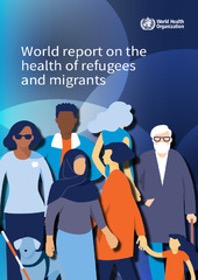 WHO World report on the health of refugees and migrants. WHO, 20 July 2022.
WHO World report on the health of refugees and migrants. WHO, 20 July 2022.
“Walking the talk”: Examples of WHO’s contributions to refugee health promotion. Promoting the health of refugees and migrants: global action plan, 2019–2023.
Report by the Director-General WHO.
List of UN Commemorative Days in July and August with relevance to psychology and human rights
- July 11 International Day of Reflections and Commemoration of the 1995 Genocide in Srebrenica
- July 11 World Population Day
- July 30 World Day Against Trafficking in Persons
- August 9 International Day of the Worlds Indigenous Peoples
- August 12 International Youth Day
- Aug 19 World Humanitarian Day
- Aug 21 International Day of Remembrance and Tribute to the Victims of Terrorism
- Aug 22 International Day Commemorating the Victims of Acts of Violences based on religion of belief
- August 23 International Day for the Remembrance of the Slave Trade and its Abolition
- August 30 International Day of the Victims of Enforced Disappearance
GNPHR NEWS AND EVENTS
Publication – Special Issue on Human Rights and Psychology – Available with OPEN ACCESS
![]()
Derek Indoe, Merry Bullock, and Polli Hagenaars, Psychology and human rights—introduction to the special issue, Editorial, International Journal of Psychology: Volume 59, Issue 2, Pages: i-iv, 215-352, April 2024,
The role of human rights in psychology and the incorporation of human rights perspectives and documents into psychological research, service and action has been gaining attention over the last years. This special issue continues that attention with articles proposing general models of the interaction of human rights and psychological processes, and providing specific examples of how a human rights perspective might be operationalized and enacted in our work.
Although human rights have existed for a long time in different regions and religions, today they find their global basis in the Universal Declaration of Human Rights (UDHR, 1948). The core principle guiding the UDHR is ‘the inherent equal dignity of all members of the human family’. The human dignity of every person is exercised and upheld by their own agency, and not dependent on the goodwill of others. This means that the focus of human rights implementation must move beyond legal and intergovernmental relations, to be ‘people-centered’. That is, beyond the global and overarching legal implications of the UDHR and its subsequent Covenants and Conventions, the knowledge and responsibility of the profession and practice of psychology is essential for a society grounded in a human rights framework.
Read on: https://onlinelibrary.wiley.com/toc/1464066x/2024/59/2
Read articles:
- The five connections: A human rights framework for psychologists, Kirby Huminuik
- Interpreting human rights as the social psychological phenomenon of rights claiming, George Drazenovich and Mirella Stroink
- Evaluating the impact of human rights education on the adjustment of Greek primary school students, Vaia Stavrou, Andreas Brouzos, Stephanos P. Vassilopoulos, and Vasilios Koutras
- Rights for me but not for thee: Restriction of human rights based on group membership and threat perceptions, Trinity Geedy-Gill and Kevin R. Carriere,
- Women, girls, and climate change: Human rights, vulnerabilities, and opportunities, Nancy M. Sidun and Judith L. Gibbons
GNPHR Human Rights and Psychology series
For recordings of all Webinars, see: https://humanrightspsychology.org/webinars/
Next GNPHR webinar: September 27, 2024 on human rights/suicide.
CONTENT AREAS AND NEWS
General
Intimate partner violence: the importance of recognising the unseen
Joana Bücker, Denise Bisolo Scheibe, Letícia Sanguinetti Czepielewski, The Lancet, Vol. 11, Issue 8, August 2024.
Intimate partner violence (IPV) is a global problem, defined as physical, emotional, and sexual violence as well as controlling and coercive behaviours perpetrated by an intimate partner that could lead to mental health problems. Although men experience violence in intimate relationships, women are usually the victims. IPV is more frequent in low-income and middle-income countries and its rates, which are probably underestimated, have been increasing in the past 2 years,…
Our accidental finding highlights a crucial feature of IPV that should be considered in future studies: the invisibility of IPV that might not be revealed solely from self-report measures.
Unfortunately, victims and even health-care professionals have difficulties identifying some forms of abuse, mainly violence other than physical. Gender-related social norms and beliefs help to perpetuate IPV and some abusive behaviours are perceived as inherent within marital relationships.
Academic Freedom / Higher Education
‘The Scholars of Ukraine’ to Receive Scholars at Risk 2024 Courage to Think Award.
Posted June 10, 2024.
Scholars at Risk (SAR) announced today that the ‘scholars of Ukraine’ are the recipient of the 2024 Courage to Think Award, recognizing their courage, resilience, and unwavering commitment to their teaching, research, students, and higher education institutions, despite the existential threat posed by war.
The award will be presented at the SAR Global Congress on Wednesday, June 26th at the European Humanities University (EHU) in Vilnius, Lithuania.
The Courage to Think Award is given by SAR to individuals, groups, or institutions that have demonstrated an exemplary commitment to protecting scholars and promoting academic freedom, whether through their professional work, private or community service, often in the face of personal risk.
Climate Justice
Susan Solomon: ‘Healing the earth is possible’.
Matthew Reisz, Times Higher Education, June 6, 2024.
Having brokered some of the world’s biggest pacts on global warming, MIT climate scientist Susan Solomon tells Matthew Reisz why she is optimistic that environmental damage can be reversed.
At a time of widespread “eco-catastrophism”, says Susan Solomon, it is all too easy to “just wallow in our misery and how terrible everything is…But ‘all is lost’ is exactly the opposite of where we need to be.” Now based at the Massachusetts Institute of Technology, Solomon has spent four decades researching, teaching and communicating climate science while also leading seemingly endless international environmental negotiations. From 2002 to 2008, she served as co-chair of the United Nations’ Intergovernmental Panel on Climate Change (IPCC) – a role that saw her picked out by Time magazine in 2008 as one of the 100 most influential people in the world.
Solomon’s work provided crucial support for the 1987 Montreal Protocol on phasing out the production and consumption of ozone-depleting substances. The protocol is still the only UN treaty ever to have been signed by every single member nation, and Solomon’s book describes it as “the world’s greatest international environmental success story”.
To complete the circle, it was also one of Solomon’s papers, published in Science in 2016, “that is widely acknowledged as the first to show that the Antarctic ozone hole is starting to show signs of healing”, she says.
Crimes against humanity
How Lonnie G. Bunch III Is Renovating the “Nation’s Attic”
Julian Lucas, The New Yorker, July 9, 2024.
The Smithsonian’s dynamic leader is dredging up slave ships, fending off culture warriors in Congress, and building two new museums on the National Mall.
In September, 2016, when the Smithsonian’s crown-like National Museum of African American History and Culture (N.M.A.A.H.C.) opened its doors to the public, its founding director, Lonnie G. Bunch III, might easily have rested on his laurels—content, in his words, to know that he’d succeeded in “making the ancestors smile.”
Securing Black history a permanent place on the National Mall had once seemed like “A Fool’s Errand”—the title of his memoir about the experience—an endeavor so fraught with political and racial baggage that its achievement had eluded his predecessors for over a century. He’d spent more than a decade courting donors, lobbying lawmakers, arguing with architects, and crisscrossing the country for a grassroots acquisitions campaign modelled on “Antiques Roadshow.” (The collection would come to include everything from James Brown’s cape to a segregated train car from the Jim Crow South.) It all culminated in a star-studded celebration, choreographed by Quincy Jones, in which Barack Obama rang a bell from one of the country’s oldest Black churches. The joyful mood was transient, but the museum wasn’t. Months later, when Bunch gave a tour of N.M.A.A.H.C. to a blithe and bewildered Donald Trump, the “Blacksonian” became a symbol of all the progress that reactionary grievance politics couldn’t reverse.
COTTON CAPITAL. A Special Investigation 2023 How slavery changed the Guardian, Britain and the world
It first started in one city. In July 2021, the mayor of Amsterdam formally apologised for its role in slavery. Femke Halsema said it was “time to engrave the great injustice of colonial slavery into our city’s identity”. Six months later, Rotterdam’s mayor, Ahmed Aboutaleb, formally apologised on the International Day of Human Rights. Aboutaleb said the predecessors of the city’s executive board were “partly responsible for colonial oppression, from the Caribbean and Africa to Indonesia”. Then, two months after Rotterdam, Utrecht mayor Sharon Dijksma acknowledged the “dark side of our city’s history” and also formally apologised. By the end of 2022, the Dutch prime minister Mark Rutte offered a formal apology on behalf of the whole country for the Netherlands’ historical role in the slave trade.
The national apology followed the conclusions of a national advisory panel set up after the murder of George Floyd in the US in 2020. The panel described the Dutch participation in slavery as a crime against humanity, and called for a formal apology and financial reparations. While the government ruled out reparations, it agreed to set up a €200m educational fund.
Since then, a new study, State and Slavery, quantified the financial value to the Dutch royal family, whose colonial activities included the enslavement of at least 600,000 African men, women and children; and between 660,000 and one million people from Asia.
It’s this legacy that King Willem-Alexander is expected to formally apologise for in Amsterdam’s Oosterpark on Saturday, 150 years after Dutch slavery in effect ended.
These formal apologies haven’t been without controversy. Campaigners and descendants groups criticised the national apology for being rushed, and argued there was a lack of consultation, which showed the persistence of colonial attitudes. What should we make of these apologies and are they enough? I spoke to Jermain Ostiana, a writer and poet, who lives on the Dutch Caribbean island of Curaçao. That’s after this week’s stories.
Sign up for the Cotton Capital newsletter: a closer look at the legacy of transatlantic slavery
Starting with the Guardian’s own history, Aamna Mohdin and colleagues offer an in-depth look at the project.
Guardian wins award for exposé of founders’ links to transatlantic slavery
Press Awards recognise cross-platform Cotton Capital series, and there are wins for several Guardian reporters. Charlie Moloney, The Guardian, 19 Apr 2024
The Guardian has won a diversity award at the prestigious Press Awards after its exposé on its founders’ links to transatlantic slavery, while one of its reporters took home the award for news reporter of the year. Judges at the Press Awards called the Guardian’s cross-platform Cotton Capital series, encompassing news articles, long-form essays, podcasts, video, a magazine, a 15-part newsletter and social media content, a “breathtakingly honest mea culpa”.
They added that it was “a hugely thoughtful and comprehensive project that provides a groundbreaking example of how an organisation addresses historical links to slavery”.
Disability Rights
Aspirations and accommodations for students with disability to equitably access higher education: a systematic scoping review. Paul A. Bartolo, Michelle Borg, Anne-Marie Callus, Alistair De Gaetano, Marchita Mangiafico, Edward Mazzacano D’Amato, Carmen Sammut, Ramona Vella Vidal and Jonathan Vincent, Frontiers, The Systematic Review, November 2023.
Introduction: Several international conventions have recognized the importance of equal access to higher education on the basis of ‘capacity’. However, inequalities persist for various groups. This paper presents a systematic scoping review of studies on the aspirations and access needs of students with disability, medical and mental health conditions to equitably participate in tertiary education.
Displaced/Migrants/Refugees/Stateless
Introduction to our ‘Childhood and Migration’ blog series
Queen Mary, University of London, 1 July 2024.
Over the coming weeks, we will be publishing a series of blogs on the theme of ‘childhood and migration,’ edited by our members Adrienne Lee Atterberry (Union College, US) and Karina Ruiz (University of California Santa Cruz, US). In this introduction, Adrienne and Karina provide an overview of the series.
Link to the blog series: https://www.qmul.ac.uk/clpn/news-views/blog/
Integration policies shape ethnic-racial majorities’ threat reactions to increasing diversity
Judit Kende, Dirk Jacobs, Eva G. T. Green, Linda R. Tropp, Yuen J. Huo, John F. Dovidio, Tomás R. Jiménez, Deborah J. Schildkraut, Olivier Klein, Science Advances, Vol. 10, Issue 22, 29 May 2024.
Increasing ethnic and racial diversity often fuels feelings of threat among ethnic-racial majorities (e.g., self-identified white Americans and European nationals). We contend that these threat perceptions depend on the policy context.
Across four studies, we test whether more inclusive immigrant integration policies attenuate ethnic-racial majorities’ threat reactions. Studies 1 to 3 (n = 469, 733, and 1745, respectively) used experimental methods with white American participants in the United States. Study 4 (n = 499,075) used secondary analysis of survey data comparing attitudes of nationals in 30 European countries and measured the impact of actual changes in diversity and policies over 10 years. Our results show that integration policies shape threat reactions even in those situations when increasing diversity could be seen as the most threatening: when narratives highlight the majority’s impending minority position or when diversity suddenly increases. When policies are more inclusive toward immigrants, ethnic-racial majority participants report less threat (or no threat) in response to increasing diversity.
Education
Leading Scholars Call for Global Treaty on Free Education
International Law Should Reflect Scientific Evidence. Jo Becker, Advocacy Director, Children’s Rights Division, Human Rights Watch.
Seventy eminent scholars, experts, and researchers from 30 countries have called for a new international treaty to recognize children’s rights to free early childhood education and free secondary education. According to the experts, well-established scientific evidence shows “unequivocally” that education is foundational to children’s healthy development and lifelong prospects, but international law has not kept pace with research showing the benefits of education.
The 1948 Universal Declaration on Human Rights and subsequent treaties mandate that primary education be free and compulsory for all but are silent on early childhood education. They also stop short of requiring that secondary education be made available free, calling only on states to make it “available and accessible.” After 70 years, the scholars say, “We believe it is time for that to change.”
Human Rights Education
Human Rights Education Now! Podcast. Episodes 33, 34 & 35 with Karen Robinson are available on Human Rights Education NOW!
We are pleased to announce the availability of our latest installment of podcast episodes in Human Rights Education NOW! Episodes 33, 34 and 35 feature conversations with Karen Robinson. Karen Robinson has over 35 years of experience in human rights, human rights education, community and youth development, and community organizing. Karen started her career at American University where she helped start the Center for Volunteerism and Community Service. Later, Karen moved to Amnesty International, USA where she served as the Mid-Atlantic Regional Deputy Director and Director of the Human Rights Education program. In that capacity, she served six years as the Chair of the International Human Rights Education Coordinating Committee for Amnesty International globally. As the Director of Human Rights Education at Robert F. Kennedy Human Rights (RFKHR), she led the creation of the Speak Truth To Power Human Rights Education program. Working with local partners, she has helped start HRE programs in South Africa, Bosnia and Herzegovina, Spain, Mexico, Canada, Greece and numerous schools across the U.S.
Inclusion, Exclusion, Racism
Linking Geographically Mediated Racial Threat and Racial Resentment
Kevin T. Morris, Sociological research for a dynamic world, January 30, 2024. Open Access
In recent years, the utility of the racial resentment scale for measuring specifically racialized attitudes of white Americans has come into question. This visualization shows that despite these critiques, racial resentment is highest in precisely the parts of the country where geographically mediated threat is most salient: the whitest parts of the least white states. This link between threat and resentment provides a helpful way to think about these two distinct but related theoretical concepts together.
In recent years, the theoretical concept of geographically mediated racial threat has been advanced in sociology and the other social sciences. The basic premise of the theory is that local and supralocal conditions matter for race relations. Andrews and Seguin (2015), for instance, demonstrated that white counties in Michigan were more likely to adopt “dry laws” in the early twentieth century if they bordered counties with many immigrants. Morris (2023) similarly showed that in the aftermath of the 2020 election, lawmakers representing very white parts of racially diverse states were the most active on restricting access to voting. The logic extends to other policies: white areas of racially diverse states might face competition in state legislatures with nonwhite citizens over issues such as education and social welfare programs. But what psychological tools do white Americans rely on to translate the feeling of threat into acceptable reasons to discriminate against nonwhite citizens?
LGBTQI+, Gender Rights
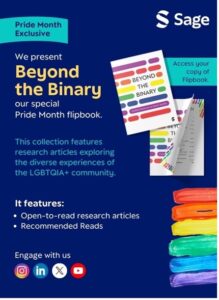 Beyond the Binary
Beyond the Binary
Curated resources on Queer studies. Heyzine Flip-books, Pride month
Promoting LGBTQIA+ rights in India
Aditi Bakshi, Sheikh Shoib, Sahifa Anjum, Jagadeeswari Vardha, Abdul Khayum, Ilham Zaidi. The Lancet Psychiatry, Vol. 11, issue 8, August 2024
In recent years, India has made significant strides towards supporting rights for the LGBTQIA+ community. In 2018, Section 377 of the Indian Penal Code was decriminalised, legalising homosexual acts between consenting adults. However, societal acceptance of homosexuality remains low, with especially poor acceptance of same-sex marriage, civil unions, or other sorts of partnerships. In addition to depriving LGBTQIA+ people of their basic rights, the absence of legal recognition exacerbates mental health disparities by increasing stigma, discrimination, and social isolation.
This article is available free of charge. Simply log in to access the full article, or register for free if you do not yet have a username and password.
Mental Health and Human Rights
In Catalonian:
Pla de recuperació: pràctiques i eines
En aquest training webinar sobre els QualityRights (Drets de Qualitat) i organitzat per la Organització Mundial de la Salut (OMS), s’aprofundeix en el significat de la recuperació en salut mental i les estratègies per a elaborar plans de recuperació. En aquest sentit, podem conèixer l’experiència de l’hospital especialitzat en trauma d’Oslo, el Modum Bad’s Traumepoliklinkken, de la mà del psiquiatra Peter McGovern i de Jan, una primera persona; així com la visió de l’activista de Zimbabwe, Jacob Shamuyarira, i del representant de l’OMS a Ucrania, Oleksii Kostiuchenkov. Tots ells treballant per l’implementació dels QualityRights en iniciatives de recuperació en salut mental. Per saber-ne més sobre els QualityRights visita: https://www.som360.org/ca/monografic/… Vídeo cedit per Department of Mental Health, Brain Health and Substance Use (MSD) World Health Organization (@who) Amb la col·laboració del Departament de Presidència. Generalitat de Catalunya (@gencat)
https://www.youtube.com/watch?v=kIVTX0Gh3nw&list=PLEenf3TXfgUh37Z2oS45ncG6tCP9N1oka
World War II veterans leave their children a legacy of trauma
Lara Bullens, France24, 27/05/2024.
The trauma experienced by World War II veterans of D-Day left a lasting impact on their children at a time before post-traumatic stress disorder (PTSD) was recognised, leaving families struggling to understand and cope with the psychological scars. Recent gatherings of experts in Normandy highlight both the enduring challenges and the resilience that was passed down through generations.
Pluralisms in psychiatry
Editorial, The Lancet Psychiatry, Vol 11 July 2024
Mental health and disorders need to be viewed on multiple levels. Our understanding can draw on adverse experiences or socioeconomic factors, genetic variation or neurobiological patterns, and psychological tendencies or phenomenological themes, and interventions range from targeting neurotransmitters to cognition. Simple explanations are appealing, but isolating the smallest biological units underlying experiences does not capture enough to explain how we work; reductionism is difficult to maintain. Mental disorders are not merely brain disorders, and reductionism ignores important aspects of human functioning such as experience, meaning, context, and culture. An essentialist view of disorders as natural entities is also difficult to hold, given the complex, dimensional, multifactorial phenomena in psychiatry.
Bangladesh needs to put a stop to malpractice in mental health-care services
Omar Faruk, Shamsul Haque, Muhammad Kamruzzaman Mozumder, Mohammad Kadir, Azharul Islam, Tarun Kanti Gayen, et al. Volume 11, 8, 588-589, August 2024.
Bangladesh passed its National Mental Health Act in 2018, replacing the century-old Indian Lunacy Act (1912), and passed its National Mental Health Policy in 2022. The National Mental Health Act offers guidelines on monitoring mental health hospitals and rehabilitation centres nationwide. The act also includes rules for assessing, admitting, and treating people with mental health problems……
In the absence of a regulatory body and code of practice, we are aware of violations of ethical practices in psychological services. Many centres do not have trained professionals or logistics for assessment and therapeutic intervention. Some centres are registered with the government, but without a monitoring system, malpractice continues. Many people without proper qualifications or clinical training call themselves psychologists and run private practices.
HHRI, 2024. https://www.hhri.org/news/39477/ – this link goes to psychological first aid in the middle east
A community case detection tool to promote help-seeking for mental health care among children and adolescents in Ugandan refugee settlements: a stepped wedge cluster randomised trial
Myrthe van den Broek, Sandra Agondeze, M Claire Greene, Rosco Kasujja, Anthony F Guevara, Racheal Kisakye Tukahiirwa,et al., Volume 8, ISSUE 8, P571-579, August 2024.
Strategies to promote mental health care help-seeking among children are needed, especially in low-income and middle-income countries and in complex settings. The aim of this trial was to compare a vignette-based, community-level, proactive case detection tool (CCDT) against standard awareness raising for promoting mental health help-seeking among children and adolescents.
Interpretation. The CCDT enabled community gatekeepers to increase mental health-care service use by children and adolescents. Vignette-based strategies rooted in the community could become a valuable contribution towards reducing the mental health-care gap among children, especially when accompanied by accessible mental health-care services.
Peace / Violence and War
Middle East
When silence kills
South African Journal of Bioethics and Law, vol.17 n.1 Cape Town Mar. 2024.
‘Every man is a social and political animal’, Aristotle, the father of politics, tells us.[1] It may not be immediately apparent to us why medicine and politics intersect and hold profound implications for humanity. Physicians are on the frontline of healthcare, bearing witness to the hardships and the many challenges in everyday life that their patients face.
The physician’s role in society
Physicians are regarded as trusted experts in healthcare and are thus in a unique position to influence and direct policy decisions within the healthcare system. It is through engaging in politics that we can advocate for our patients in areas such as healthcare infrastructure, accessing treatment options, equitable distribution of resources and ensuring that human rights abuses are exposed and stopped. Physicians also have specialised knowledge of medical ethics, and the intricacies of healthcare structures and policies. We are in a unique position to champion the causes of the poor, to reduce disparities in our society, regardless of socioeconomic status, race, or geographic location. We are also trained in evidence-based medicine, thus ensuring that policymaking decisions are grounded in scientific research and empirical data, rather than political expediency.
Complicity in silence
So why have the medical community and academia been largely ‘quiet’ in regard to the war in Gaza? Why have we not protested en masse? Daily, we watch in horror as healthcare workers are targeted, as doctors work without essential medicines and resources, risking their lives for the population they serve. The lack of resources in Gaza has been documented as far back as 2014 in a report to UNRWA. Currently, the health sector in Gaza is at breaking point. There is a public health crisis! Simultaneously, a vulnerable population has become collateral damage for political purposes, evident in the deliberate targeting of women, children and the elderly. The healthcare of an entire population is on the verge of complete public health collapse, with starvation and the spread of communicable diseases imminent. Aside from the obvious physical trauma, there exists a population that will be devastated by the long-term psychological trauma. I believe we have reached a critical point where it is beyond doubt; what the morally right thing is – it is just the right thing to do! It no longer is about being a virtuous person that requires an outcry, it is our duty and obligation.
The psychological scars will be challenging to heal, on both sides.
Addressing the mental health crisis among children in Gaza
Amira Mohamed Taha, Cameron Sabet, Sarah A Nada, Samer Abuzerr, Dang Nguyen, The Lancet Psychiatry, February 2024.
Since Oct 7, 2023, escalating violence in Gaza has intensified a mental health crisis among its 2·1 million residents, of whom 67% are refugees and 65% are younger than 25 years.1 Constant bombardment and displacement and the loss of family members are predisposing many children to anxiety, depression, post-traumatic stress disorder (PTSD), and other adverse mental health conditions. In fact, a 2020 study showed that 53·5% of Gazan children had PTSD even before this conflict.2 Such conditions often go untreated due to a lack of awareness from health professionals, a shortage of mental health professionals, and Israeli restrictions on foreign aid. Consequently, many children are deprived of necessary care, jeopardising their education, social integration, and even future employment, perpetuating a cycle of social instability. The ensuing psychological distress can increase children and young people’s susceptibility to radicalisation, as extremist groups often exploit feelings of hopelessness.
Screams Before Silence
#ScreamsBeforeSilence sheds light on the unspeakable sexual violence committed on October 7. Watch on YouTube
WHO concerned about escalating health crisis in West Bank Statement
14 June 2024 – Jerusalem/Cairo/Geneva — WHO remains concerned about the escalating health crisis in the occupied Palestinian territory, including the West Bank, where attacks on health infrastructure and increased restrictions on movement are obstructing access to health care. A spike in violence in the West Bank, including East Jerusalem, since the war in Gaza started has resulted in the deaths of 521 Palestinians, including 126 children between 7 October 2023 and 10 June 2024. In addition, over 5200 people, 800 of them children, have been injured, adding to the growing burden of trauma and emergency care at already strained health facilities.
U.N. Report Accuses Both Israel and Palestinian Groups of War Crimes
A commission produced the United Nations’ most detailed examination yet of the Oct. 7 attacks and the subsequent war in Gaza. Nick Cumming-Bruce, Geneva, June 12, 2024.
A United Nations commission investigating the Oct. 7 attacks on Israel and the subsequent conflict in Gaza has accused both Palestinian armed groups and Israel of committing war crimes, and the panel said that Israel’s conduct of the war included crimes against humanity.
In a report released on Wednesday, the three-person commission — led by Navi Pillay, a former United Nations human rights chief — provided the most detailed U.N. examination yet of events on and since Oct. 7. The report does not itself carry any penalties, but it lays out a legal analysis of actions in the Gaza conflict that is likely to be weighed by the International Court of Justice and in other international criminal proceedings. Israel did not cooperate with the investigation and protested the panel’s assessment of its behavior, the panel said.
The report said that Hamas’s military wing and six other Palestinian armed groups — aided in some instances by Palestinian civilians — killed and tortured people during the Oct. 7 assault on Israel in which more than 800 civilians were among the more than 1,200 killed. An additional 252 people, including 36 children, were taken hostage, the report said.
“Many abductions were carried out with significant physical, mental and sexual violence and degrading and humiliating treatment, including in some cases parading the abductees,” the report said. “Women and women’s bodies were used as victory trophies by male perpetrators.”
The new Jewish international: taking back the power of definition. Marilyn Garson, MONDOWEISS, June 11, 2024.
The International Jewish Collective for Justice in Palestine began in opposition to the IHRA antisemitism definition and is now a worldwide network of organizations from 16 countries working as partners with Palestinians in pursuit of justice.
Four years ago, a dozen or so Jewish justice groups began to meet monthly, online. We called ourselves the International Jewish Collective for Justice in Palestine (IJCJP). We learned about the others’ contexts, shared experiences, and ideas about resisting the IHRA Working Definition of Antisemitism. While we each work integrally with Palestinian partners on Palestine issues, we had been reacting to the IHRA definition in isolation. We learned the hard way: the definition rolled over us all. The IHRA definition is now the backdrop for the genocide which is being done in our names. Its power is pervasive. The IHRA definition has hemmed in the space of speech and protest, rendered statements of Palestinian identity and rights suspect, foreclosed on millennia of Jewish pluralism, and elevated political difference to the absolute wrong of racism. It diverts from urgent, lifesaving speech: permanent ceasefire now, sufficient humanitarian provision now, peace with justice forever. Every message must now be filtered (or rammed) through a language that places Zionist-Jewish discomfort before Palestinian survival.
Pro-Palestinian Jewish Groups From 16 Countries Hold First Ever International Congress In London
IJCJP, Scoop, 7 June 2024.
Press Release: After almost four years of meeting monthly on-line, leaders and long-time organisers representing 20 Jewish groups from 16 countries across the globe supporting justice for the Palestinian people are meeting in person in London for the first ever congress of the International Jewish Collective for Justice in Palestine (IJCJP). Participants will also be joining the Jewish Bloc on the National Demonstration for Gaza in London on Saturday June 8, expressing our conviction that justice for the Palestinian people is a precondition for justice for us all.
While Israel claims to speak for the Jewish people, growing numbers of Jews around the world are declaring that Israel does not speak in our name. Our organisations are partners in the global movement for Palestinian justice. We have come together to learn from one another and maximise the impact of our work. We stand in strong opposition to Israel’s genocide of the Palestinian people in Gaza and are active participants in global organising demanding a cease-fire now and full justice and dignity for the Palestinian people.
Physicians for Human Rights –
Israel (PHR-I) stands at the forefront of the struggle for human rights–the right to health in particular–in Israel and the Occupied Palestinian Territory. Founded in 1988 by a group of Israeli physicians led by Dr. Ruchama Marton, PHRI works to promote a just society where the right to health is granted equally to all people under Israel’s responsibility.
PHR-I employs a multi-faceted approach to achieve its goals through the provision of humanitarian aid and work promoting policy change. Through our open and mobile clinics, volunteer medical professionals provide services free of charge to people with limited or no access to health care–primarily migrants, refugees, and Palestinian residents of the West Bank and Gaza. At the same time, PHRI works to change discriminatory and abusive structures and policies towards Palestinians in the Occupied Territory, prisoners and detainees, migrant workers, refugees, undocumented persons, and Israeli residents. Our methodology includes data collection, casework, legal action, local and international advocacy, education, and mobilization of the medical community. PHRI is supported by more than 3,500 members and volunteers, and each year we serve more than 20,000 people by providing medical care or assistance in accessing the right to health.
The principles of human rights, medical ethics, and social justice are at the core of our worldview. It is our position that the medical community is sometimes complicit–passively or actively–in oppressive practices that undermine equality and health. Furthermore, PHRI views the ongoing occupation of the Palestinian Territory as a root cause of multiple human rights violations including the right to health and actively advocates for its end. Thus, in all of our work, we refuse to accept policies that increase inequality and structural violence and seek to establish an alternative that cultivates true equality and solidarity.
Gaza Mental Health Foundation. Healing the Spirit, Instilling Hope The Gaza Mental Health Foundation believe in the human rights of all people, no matter their ethnicity or religion, and recognizes the close connection between mental health and human rights.
We condemn the atrocities committed on October 7 against Israeli civilians and the ongoing atrocities committed against the Palestinian people in Gaza and the West Bank, whose human rights have been violated for 75 years.
We believe that all people have the right to live in peace, freedom and security, and our work aims to advance that goal.
Poverty
Women
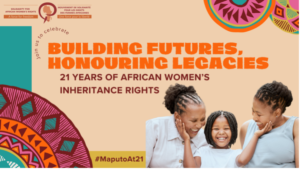 Maputo Protocol
Maputo Protocol
On July 11th, we celebrated and commemorated the 21st anniversary of the adoption of the Protocol to the African Charter on Human and Peoples’ Rights on the Rights of Women. The impact and progress of the Protocol continue to ring critical 21 years later.
Here are 21 reasons why the Maputo Protocol remains beneficial to women and girls in Africa: https://equalitynow.org/news_and_insights/21-reasons-why-the-maputo-protocol-is-beneficial-to-women-and-girls-in-africa/
This occasion allows us to celebrate the great strides made in advancing women’s rights and usher in a renewed era of advocating for the rights of women and girls in Africa. While the Maputo Protocol is recognized globally as one of the most progressive and most ratified human rights instruments, we must continue to champion the universal ratification and implementation of the Protocol.
Post-Roe v Wade psychiatry: legal, clinical, and ethical challenges in psychiatry under abortion bans
Nina Kraguljac, Debra Bruns, Paul Appelbaum, Erika Botello, Victoria King, Natalie Remiszewski, et.al.. The Lancet Psychiatry, May 22, 2024.
In recent history, the world has witnessed a trend towards liberalization of abortion laws driven by an increasing understanding of the negative personal and public health consequences of criminalizing abortion. By contrast, several countries have recently implemented restrictive reproductive laws, joining the 112 countries where access to abortion care is banned completely or with narrow exceptions. On June 24, 2022, the US Supreme Court ruling in Dobbs v Jackson Women’s Health Organization overturned its landmark decisions in Roe v Wade that established abortion until the point of viability of the fetus as a constitutional right. After Roe v Wade having been overturned, it is projected that many women in the USA will be prevented from accessing safe abortion care. Importantly, abortion bans not only impose constraints on patient autonomy, they also restrict physicians’ ability to practice evidence-based medicine, which will negatively impact psychiatric care. It is therefore crucial for the practicing psychiatrist to be familiar with this new legal landscape. In this Personal View, we aim to provide a topical overview to help clinicians gain a clear understanding of legal, clinical, and ethical responsibilities, focusing on the USA. We also discuss the reality that psychiatrists might be called upon to determine medical necessity for an abortion on psychiatric grounds, which is new for most US psychiatrists. We predict that psychiatrists will be confronted with very difficult situations in which lawful and ethical conduct might be incongruent, and that abortion bans will result in greater numbers of patients needing psychiatric care from a system that is ill-prepared for additional demands.
PUBLICATIONS
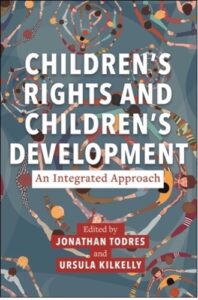
Children’s Rights and Children’s Development: An Integrated Approach (Families, Law, and Society)
Hardcover – January 21, 2025. Jonathan Todres & Ursulla Kilkelly (Eds.)
Offers an assessment of how children’s rights take shape and are realized at various stages of child development and, in turn, can and should inform law and policy. Children’s rights and child development frameworks are critical to understanding children’s lived experiences, advancing child wellbeing, and implementing children’s rights. However, research in the two fields has proceeded largely on separate tracks. Children’s Rights and Child Development seeks to forge opportunities to deepen understanding about children’s rights in light of the scientific research on child development to inform fresh perspectives on research, law, and policy affecting children.
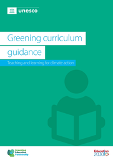
Greening curriculum guidance: teaching and learning for climate action. UNESCO [8082]. 2024. ISBN : 978-92-3-100685-2
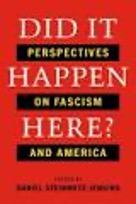
Did It Happen Here? Perspectives on Fascism in America. Daniel Steinmetz-Jenkins (Eds.), Norton, 2024. Reviewed by Jessica Mathews, February, 2024, Foreign Affairs.
An anthology of classic texts on fascism combined with analyses by contemporary writers on the present situation in the United States, this volume is intended to shed light on what its editor calls “the fascist debate.” That debate proceeds on two very different planes. One is principally an academic argument between comparative political scientists and historians about whether there is any merit to comparing the contemporary era of U.S. politics with the early-twentieth-century rise of fascism in Europe. The more compelling debate concerns where U.S. politics now lies on the political spectrum from truly democratic to pre-fascist or outright fascist. (The book was written and edited before the Republican presidential candidate Donald Trump in late 2023 referred to his political opponents as “vermin” and accused immigrants of “poisoning the blood” of the country, inviting direct comparisons to the rhetoric of Adolf Hitler.) As is true of most edited volumes, the contributions vary greatly. Enough of them are highly informative and thought-provoking to make the book a valuable read for anyone hoping for more insight into the direction of the country.
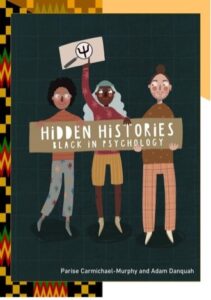 Hidden Histories – Black in Psychology. Parise Carmichael-Murphy and Adam Danquah, March 2024. https://dclinpsych.leeds.ac.uk/wp-content/uploads/sites/26/2022/10/Hidden-Histories_Black-in-Psychology.pdf
Hidden Histories – Black in Psychology. Parise Carmichael-Murphy and Adam Danquah, March 2024. https://dclinpsych.leeds.ac.uk/wp-content/uploads/sites/26/2022/10/Hidden-Histories_Black-in-Psychology.pdf
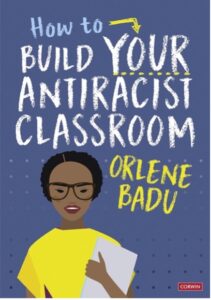
How to Build Your Antiracist Classroom Paperback, Orlene Badu, Sage, May 2023.
Taking on the pervasive issue of racism within education Badu offers a practical, no-nonsense guide on building an antiracist classroom. This book takes the reader on a journey from examining their own bias and racial literacy, to developing a diverse curriculum and improving the culture, to effecting wider changes across the school. Whether as an ally or recipient of bias in our society; this book will offer educators a guide to all the things we can do in the classroom to effect profound social change. If you seek to disrupt the cycles of systemic inequality that have existed in society and education for decades, this is the book for you.
OPPORTUNITIES
Resources
Human Rights Education Resources: HREA, Search by Human Rights theme. https://hrea.org/resources/
UPCOMING EVENTS
The International Council of Psychologists 83rd Annual Conference
JOIN the International Council of Psychologists in Rotterdam, Netherlands for its 2025 Annual International Conference!
This vibrant conference will celebrate ICP’s mission to support Human rights, Dignity, and Justice: Social Inclusion and Migration
Location: Rotterdam, Erasmus University College
CALL FOR PAPERS: https://icpweb.org/icp-annual-conference/call-for-proposals-icp2025/
40th Annual Conference of Human Dignity and Humiliation Studies. ‘Global Vulnerabilities – From Humiliation to Dignity and Solidarity’. Madrid, Spain, 17th – 20th September 2024
Please visit this webpage regularly for the latest information, as plans for this conference unfold.
If you wish to participate, please register here! Please know that you are invited to spend the entire conference with us, so that true dignity-family-building can emerge! All our events are part of an ongoing effort to nurture a global dignity community.
There is no registration fee, we share minimal cost according to ability at the end.
EXPLORE THE RICH TAPESTRY OF CONFERENCES IN SOUTH AFRICA
From psychology to commerce, and from social issues to academic research, the conference landscape in South Africa is as diverse as it is dynamic. Here are four noteworthy conferences that are set to captivate attendees with their innovative themes, thought-provoking discussions, and networking opportunities.
PAPU Conference: Uniting Africa
8 -11 October 2024 – Johannesburg, South Africa
The Pan-African Psychology Union (PAPU) Congress stands as a beacon of unity and collaboration, bringing together psychologists, researchers, and scholars from across Africa and beyond. This conference serves as a platform for discussing pressing issues facing the continent, exploring cultural nuances in psychology, and fostering interdisciplinary connections. This year is the 10th anniversary of the Pan-African Psychology Congress.
PSYSSA Congress: Advancing Psychological Science in South Africa
8 – 11 October, 2024 – Johannesburg, South Africa
In 2024, South Africa will celebrate the 30th anniversary of democracy and the end of Apartheid. South Africa’s national psychology body is celebrating its 30th anniversary, having been established three months before the country’s liberation. Over the past 30 years of democracy, the country has faced issues that require continued engagement and fight. However, psychology has advanced significantly during this time and has grown stronger since the democratic age. PsySSA was founded on democratic principles and aims to serve all psychology professionals, in contrast to previous associations.
INHS Biennial Conference: Exploring the Dynamics of Hate
25 – 27 November 2024- Cape Town, South Africa
The International Network for Hate Studies (INHS) is pleased to issue a call for papers for the fifth conference, “Dynamics of Hate: Examining Interdisciplinary Perspectives”. The University of South Africa (Unisa) and the Psychological Society of South Africa (PsySSA) will co-host the first INHS conference in the Southern Hemisphere. From hate speech to hate crimes, this conference delves into interdisciplinary perspectives to understand and combat hatred in all its forms.
CONTACTS: Published by the Global Network of Psychologists for Human Rights – www.humanrightspsychology.org
Disclaimer: The website of the Global Network of Psychologists for Human Rights (GNPHR) contains articles, events and news about the domain where psychology and human rights intersect. The information presented in this Bulletin, does not imply that the GNPHR shares the views and beliefs in the articles.
- @GNPHR1
- How to get involved – read how you can contribute to the global network
- Consider contributing a Blog/Commentary
- News and Bulletins from the GNPHR – Subscribe to GNPHR
- Email addresses:
Ways to Participate in Global Network Activities
- Share Your Experiences and Examples
One of the best ways to illustrate the intersection of psychology and human rights is through example. We are looking for examples of your encounters with human rights issues in your professional life. You might describe a time when you protected (or failed to protect) human rights, or advocated for what you saw as a human rights issue. The events might be in your clinical, research, academic, applied, or volunteer work. Please send your narrative / story (500-1000 words) to Marlena Plavšić (marlena_plavsic@hotmail.com). We will compile these for publication in the GNPHR Bulletin and on the website. Please also indicate if you would like your stories to remain anonymous. - Share your Expertise and Opinions
We invite you to contribute a blog or opinion piece on general human rights issues; human rights education or strategies for raising the profile of human rights within psychology or your professional life. Students are welcome to contribute, including on student needs for learning about and addressing human rights. Please contact the GNPHR Blog editor (blogeditor@humanrightspsychology.org) with ideas for the article you would like to write! - Send articles/news/events
If you come across a human rights article or news, or know of an upcoming hunman rights event, please send for publication in the Bulletin. Send to the Bulletin editor Polli Hagenaars (polli.hagenaars@gmail.com).

